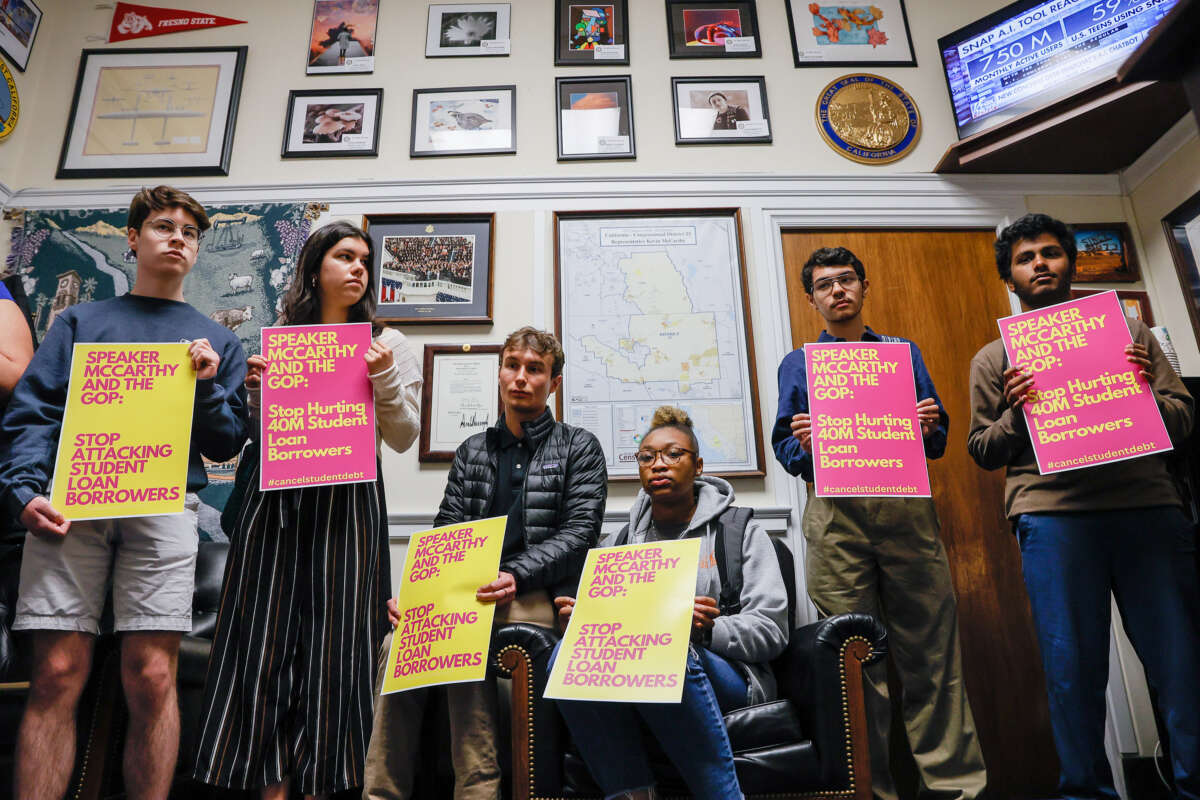The debt ceiling deal struck between President Joe Biden and House Speaker Kevin McCarthy (R-California) throws student debtors under the bus by forcing student loan payments to restart at the end of this summer with recourse for the presidential administration.
The bill mandates that the ongoing student loan payment pause, which has been in place since March 2020, will end on August 30, forcing people to begin repayments in September or risk default.
Further, it bars the Biden administration from issuing another extension of the pause, which has changed people’s lives financially as the nation struggles through ongoing economic precarity. “Except as expressly authorized by an Act of Congress,” the bill stipulates, “the Secretary of Education may not use any authority” to extend the payment pause.
If the deal is passed through Congress and the U.S. avoids a national default, which would be economically disastrous, it would implement a sweeping change at a time of great uncertainty for student debtors.
The Supreme Court has yet to make a ruling on Biden’s plan to cancel up to $20,000 of student debt for borrowers across the country, meaning that tens of millions of debtors who could have their debt balances reduced or wiped out entirely under the plan could find themselves once again having to pay off the full balance of their loans after years of relief under the pause.
The deal is a major blow to debtors and activists, who say that the proposal to end the pause is hasty and irresponsible with the Supreme Court ruling in the balance.
“The Biden admin was gearing up to resume payments *because* they were going to simultaneously cancel lots of debt — 20 million accounts zeroed out. Because of COVID’s impact, the Biden admin said returning to repayment *needed to be coupled* with relief,” the Debt Collective pointed out on Twitter on Monday, echoing the Biden administration’s own arguments before the Supreme Court earlier this year.
The deal, then, “puts the cart before the horse,” the group wrote. “If SCOTUS rules Biden *cannot* implement relief, Biden can try again with a different legal authority — and he should. But what if it takes a few weeks/months to implement? What if he doesn’t try again? Borrowers will have no debt relief but be expected to make costly payments.”
The Debt Collective recently uncovered that the legal basis for Republican states’ lawsuit against Biden’s student debt plan is reportedly outright false. However, the Supreme Court appears sympathetic to the Republican states’ case anyway, and is likely to rule to nix the plan.
The combination of no debt relief and the restarting of payments would have negative impacts on the economy. According to a Federal Reserve survey released last week, 37 percent of Americans did not have enough money to cover a $400 emergency expense in 2022, with 35 percent of Americans saying they were worse off than the previous year — a record high.
Restarting payments and interest would only exacerbate these economic problems, with many people saying that they are unprepared to begin repaying loans. This would especially impact lower-income and Black and Latinx Americans, as research has continually found that student debt disproportionately affects these groups.
Republicans have targeted student debt forgiveness in other ways. Last week, House Republicans, joined by two conservative Democrats, voted to pass legislation that would block Biden’s cancellation plan, end the payment pause, and, cruelly, force borrowers to pay retroactive payments on student debt payments that were suspended under the pause, according to student debt activist groups.
Trump is silencing political dissent. We appeal for your support.
Progressive nonprofits are the latest target caught in Trump’s crosshairs. With the aim of eliminating political opposition, Trump and his sycophants are working to curb government funding, constrain private foundations, and even cut tax-exempt status from organizations he dislikes.
We’re concerned, because Truthout is not immune to such bad-faith attacks.
We can only resist Trump’s attacks by cultivating a strong base of support. The right-wing mediasphere is funded comfortably by billionaire owners and venture capitalist philanthropists. At Truthout, we have you.
Truthout has launched a fundraiser to raise $45,000 in the next 8 days. Please take a meaningful action in the fight against authoritarianism: make a one-time or monthly donation to Truthout. If you have the means, please dig deep.
